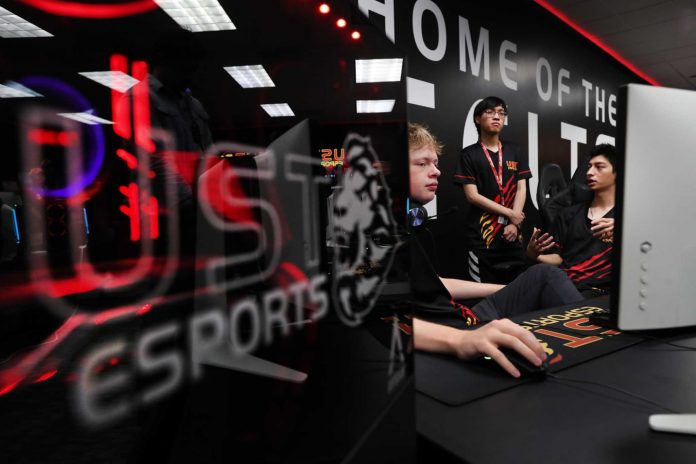
Esports has become a varsity sport on many college campuses across the country but now it has become an academic pursuit as well. Yes, more and more esports courses are popping up where students can accrue college credits. That’s how pervasive esports has become and how its popularity is responsible for an entire industry, replete with good-paying jobs in a variety of capacities.
Colleges and universities across the world make it their mission to educate their students and prepare them for the world outside the academic paradigm. And as the world around us changes, so too must our institutions of higher learning change with it. We are seeing this occur almost daily and those that don’t adjust are left behind.
West Virginia University is among those that will be offering a 15-credit minor in esports starting in 2022. And it is not just in the classroom but on the virtual field of battle as the Mountaineers recently recruited a 19-year-old economics major from Maryland named Noah Johnson who also happens to be a superstar esports player.
“I was receiving different offers from other colleges. After having conversations with Josh, I liked the vision and direction of the WVU program,” Johnson stated. “It also helped that Josh was a cool dude.”
The “Josh” in question is Josh Steger, WVU esports Director, and recently named the National Association of Collegiate Esports (NACE) Madden Coach of the Year. “Being named NACE Coach of the Year for Madden is an honor,” said Steger. “Coaching a group of players that want to be better and put in the work to be better is awesome to have. From day one these guys got along, showed up on time, did everything that was asked of them, and in return, I was just happy to be a tool for their success. As individuals they are great, but as a team, they are one of the best in the country. Being named coach of the year is not for me, but for us.”
Esports has become big business as evidenced by the stunning prize money being awarded at some of the industry’s biggest tournaments. The International 10, or TI10, is Dota 2’s grand event this year and there is $40 million in prize money up for grabs with over $14 million of it being awarded to the winners. The industry has become so popular that the best sportsbooks in the world are offering esports on its betting menus much as they would offer the NFL, MLB, NBA, NHL, or professional soccer.
The University of New Haven has also embraced esports as an academic pursuit and stated the following, “The University of New Haven’s interdisciplinary major in esports and gaming is designed to maximize our strengths in business, technology, engineering, and computer science, to create pioneering opportunities that prepare our students to be the future leaders in this high-growth field.”
If You Build it, They Will Come
Some of the finest esports venues can be found on college campuses and examples of those state-of-the-art facilities are located at The University of Akron, Western Michigan University, University of Utah, Miami University (OH), Illinois Wesleyan University, Grand Canyon University, Harrisburg University, University of California, Irvine, and “The Fortress” at Full Sail University.
Mark Deppe, Director of the University of California Irvine Esports, said during the height of the pandemic, “COVID-19 has been both a challenge and a boon for esports. More people are playing video games and watching online content than ever before. The UCI teams have been able to compete in collegiate tournaments from home. With that said, all major live events were canceled, including the Overwatch League matches in March and April and the League of Legends Mid-Season Invitational, which was originally scheduled for May. I think the sizzle of esports that comes with major live events is missing, but the community and broader ecosystem are thriving.”
The University of Texas is embarking on its own esports arena. Longhorn Gaming has been in existence for 11 plus years and continues to grow. At some point down the line, the university may consider offering esports scholarships as others have done. The planned arena will be in the neighborhood of 3000 to 3500 square feet and will cost roughly $1.5 million.
James Buckley, Director of Facilities at the University of Texas, as quoted as saying, “There is a noticeable void of an esports space on campus. We envision 24 to 30 stations where players can compete and we will have a place people can watch. Once we get our space built, I think the interest and likelihood of that could grow as we work with our development office. In total, we have between 3,100-3,500 square feet that we see potentially being developed for esports space.”
As the industry continues to boom, so too will the number of colleges and universities offering not only a place to play but a possible career path as well.




















It’s kind of interesting that gaming is taking relevance in academia, but not surprising considering the demographic is comprised of young adults, especially high school graduates that have the scholarship to partake in higher education.
Colleges and universities are much different than what they were decades ago. They used to be more about earning the prestige to be eligible to work in more advanced fields, where really only a handful of people would enter colleges/universities. But now colleges/universities are more about the social experience where most of the youth feel compelled to enter due to the rising job market and demands for college degrees.